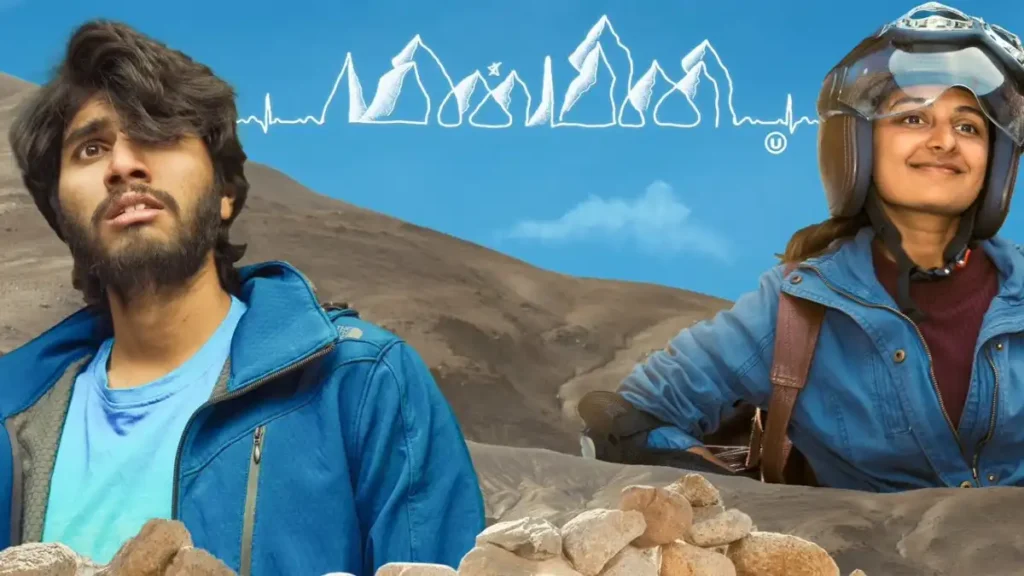This is a blunt movie. Barring a few scenes, the delicacy we associate with Halitha’s work is missing.
Minmini opens in a boarding school in Ooty. A teacher walks into a classroom and sees a beautiful chalk drawing on the blackboard. She needs to get on with class, but she doesn’t have the heart to erase this drawing. (“Idha azhikka manasu varala,” she says.) So she asks a student to erase it. This is a trademark Halitha Shameem vignette, a little scene that reveals a little bit not just about this teacher-character but also about something larger: sometimes, you cannot bring yourself to destroy something beautiful, even if it’s necessary to do that in order to move on. The USP of Minmini is that of Richard Linklater’s Boyhood, that the director waited for youngsters to grow up, so that the same actors could play themselves eight years older. But the USP is really Halitha’s sensibility. Even if different actors had played these characters as youngsters and as grown-ups, Halitha’s sensibility would have held this scene together.
Here is another scene, another example of this director’s sensibility. A young girl has been resuscitated with the organs of a dead schoolboy. She knows who this boy is. She wants to do something in return. She wants to fulfil this boy’s dreams, and so she tells her mother that she wants to join the school this boy was in. The wording of the mother’s response is a little too “Tamil cinema”, but the essence is beautiful. She tells the girl that this is a very good thing. And she says, “But don’t be sad. Don’t live with the guilt that the boy had to die in order for you to live. I want you to be happy.” Wow. I mean: wow. What a fantastic sentiment! In the earlier scene with the blackboard, a small moment has been made big and profound. Here, a potentially big and profound moment has been reduced in size and made casual and lifelike.

Minmini means glow-worm or firefly, and that’s the essence of the film: that life is short and it needs to glow with warmth and light. An early scene – just a few frames, practically – shows a boy-footballer named Pari (Gaurav Kaalai) with these insects. He will find himself connected to two people: Sabari (Praveen Kishore) and Praveena (Esther Anil). The first half is about life in a boarding school, filled with students and teachers and hostel wardens. The second half is the exact opposite. It takes place in the desolate Himalayas, with mainly just two people. The first half is filled with concrete events that bounce off each other (like a rivalry, or an accident, or the beginning of survivor’s guilt). The second half is filled with diffuse philosophy. In other words, Minmini is an ambitious venture, both structurally and in the way it resists spoon-feeding us with easy emotion – despite Khatija Rahman’s overblown score, which is diametrically opposite to Halitha’s minimalism.
I have always liked Halitha Shameem’s films, and I have always felt she has a very distinct voice. But with her anthology short film Loners, she really broke through to another level and the film signified the arrival of a major writer-director. But Minmini is a step back. The intent does not result in a satisfying film. In Loners, which was also about two characters (like in this film’s second half), Halitha took us into the soul of these characters. The offhand dialogues, the philosophical exchanges – everything revealed something unexpected. Here, the two characters are very surface-level, and the simplistic, lecture-like philosophy simply underlines what we already know. There is no deeper layer. This is a blunt movie. Barring a few scenes, the delicacy we associate with Halitha’s work is missing.
There are very obvious touches like the focus on these words inside a book: “Every great friendship starts on a rival note.” This is meant to alert us to the fact that two boys who are rivals are soon going to be friends. Yes, it is true that what we read can shape how we act in life and change our perception about people. But the staging of this part is too direct and too message-y, like the voiceovers in the second half. In theory, I liked the idea of two people finding each other as they bike through the Himalayas. I liked the idea of a screenplay being shaped like a travel vlog, with a road-movie feel of meeting strangers and being shaped by them. But these bits are too disconnected and the central conceit holding the two characters together – the core emotion – never comes across.
The conflict points are set up in the first half. (1) How will someone overcome survivor’s guilt? (2) How will someone repay a major debt? And it is to Halitha’s credit that the second half meanders like those mountain roads instead of focusing only on these conflicts. She is trying to give the characters closure through the course of a long journey. But some of the scenes are so cutesy – like one where they talk about butterflies, or one set in an art gallery – that you wonder who wrote and directed them. The big dramatic reveal at the end involving a character from the past seems too sudden and too coincidental for this kind of screenplay, but I did like the closing image very much. It is about two hearts, literally and figuratively. There is a sense of closure and yet, there is also the sense of a future as wide-open as the Himalayas. These handful of good scenes needed to be in a much better movie.
|
|



Pingback: Halitha Shameem’s ambitious ‘Minmimi’ has a handful of good scenes, but the overall film isn’t satisfying | Baradwaj Rangan